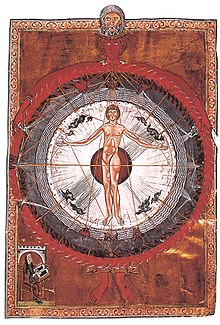
Back Mistisisme Afrikaans Mystik ALS روحانية (ديانات) Arabic Misticismu AST Mistisizm Azerbaijani عرفان AZB Мистицизъм Bulgarian রহস্যবাদ Bengali/Bangla Kevrinelezh Breton Misticizam BS

| Part of a series on |
| Spirituality |
|---|
| Outline |
| Influences |
| Research |
| Part of a series on |
| Universalism |
|---|
 |
| Category |
| Part of a series on |
| Esotericism |
|---|
 |
Mysticism is popularly known as becoming one with God or the Absolute,[1][2] but may refer to any kind of ecstasy or altered state of consciousness which is given a religious or spiritual meaning.[web 1] It may also refer to the attainment of insight in ultimate or hidden truths, and to human transformation supported by various practices and experiences.[web 2]
The term "mysticism" has Ancient Greek origins with various historically determined meanings.[web 1][web 2] Derived from the Greek word μύω múō, meaning "to close" or "to conceal",[web 2] mysticism came to refer to the biblical, liturgical (and sacramental), spiritual, and contemplative dimensions of early and medieval Christianity.[3] During the early modern period, the definition of mysticism grew to include a broad range of beliefs and ideologies related to "extraordinary experiences and states of mind".[4]
In modern times, "mysticism" has acquired a limited definition, with broad applications, as meaning the aim at the "union with the Absolute, the Infinite, or God".[web 1] This limited definition has been applied to a wide range of religious traditions and practices,[web 1] valuing "mystical experience" as a key element of mysticism.
Since the 1960s scholars have debated the merits of perennial and constructionist approaches in the scientific research of "mystical experiences".[5][6][7] The perennial position is now "largely dismissed by scholars",[8] most scholars using a contextualist approach, which considers the cultural and historical context.[9]
- ^ McGinn 2005.
- ^ Moore 2005.
- ^ King 2002, p. 15.
- ^ King 2002, pp. 17–18.
- ^ Horne 1996, p. 9.
- ^ Paden 2009, p. 332.
- ^ Forman 1997, p. 197, note 3.
- ^ McMahan 2008, p. 269, note 9.
- ^ Moore 2005, p. 6356–6357.
Cite error: There are <ref group=web> tags on this page, but the references will not show without a {{reflist|group=web}} template (see the help page).